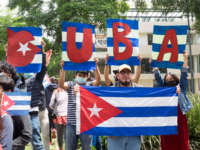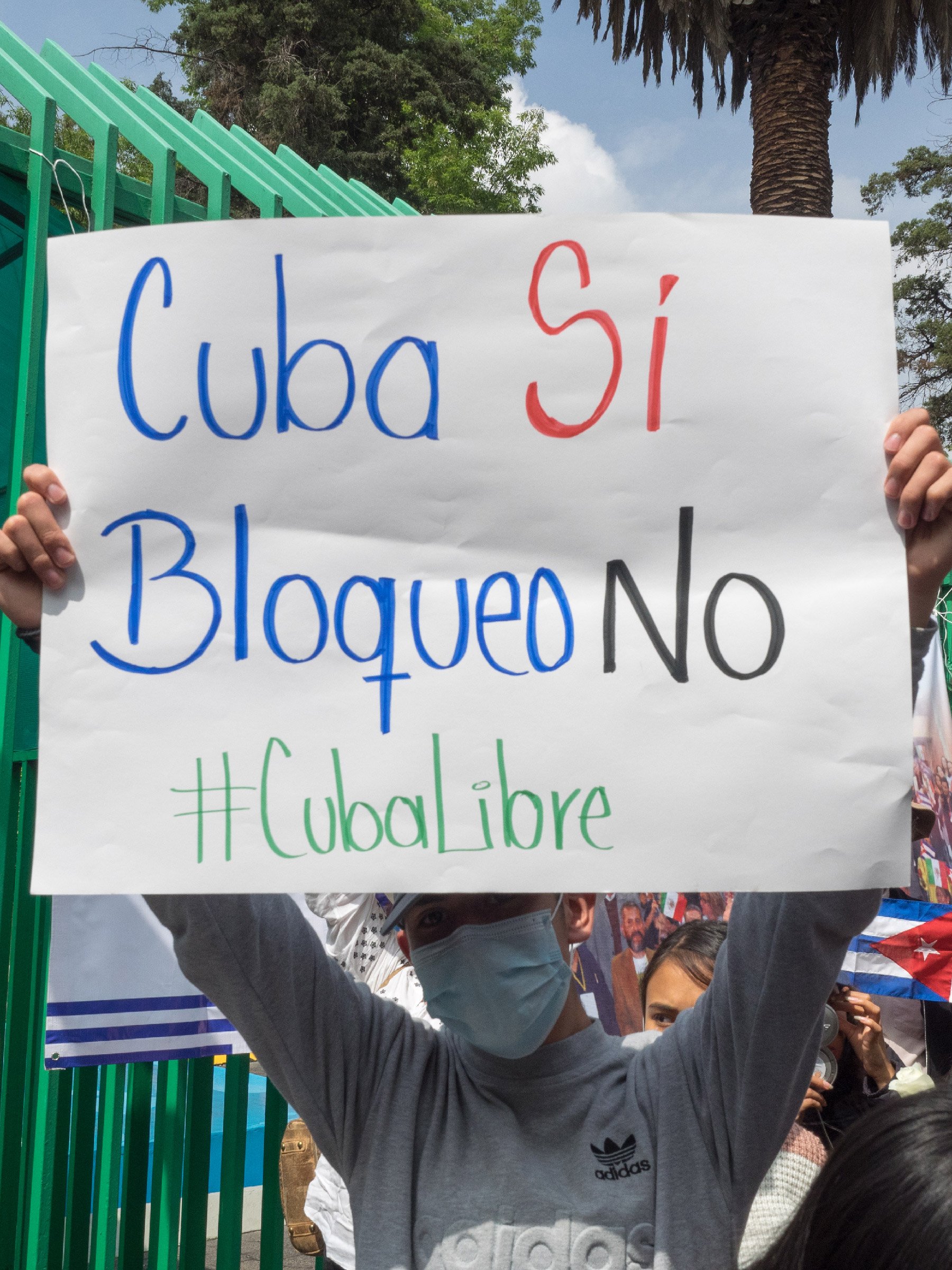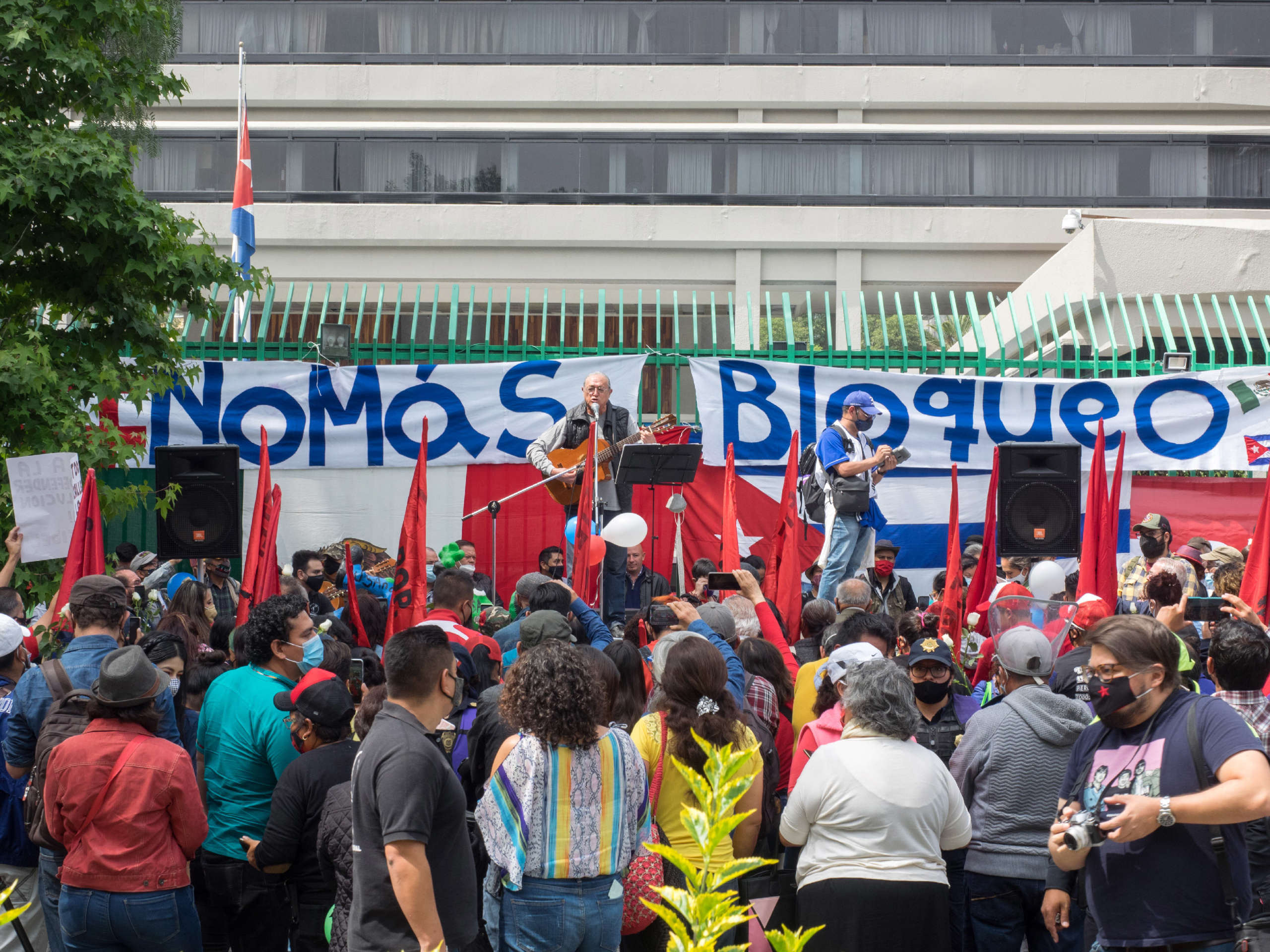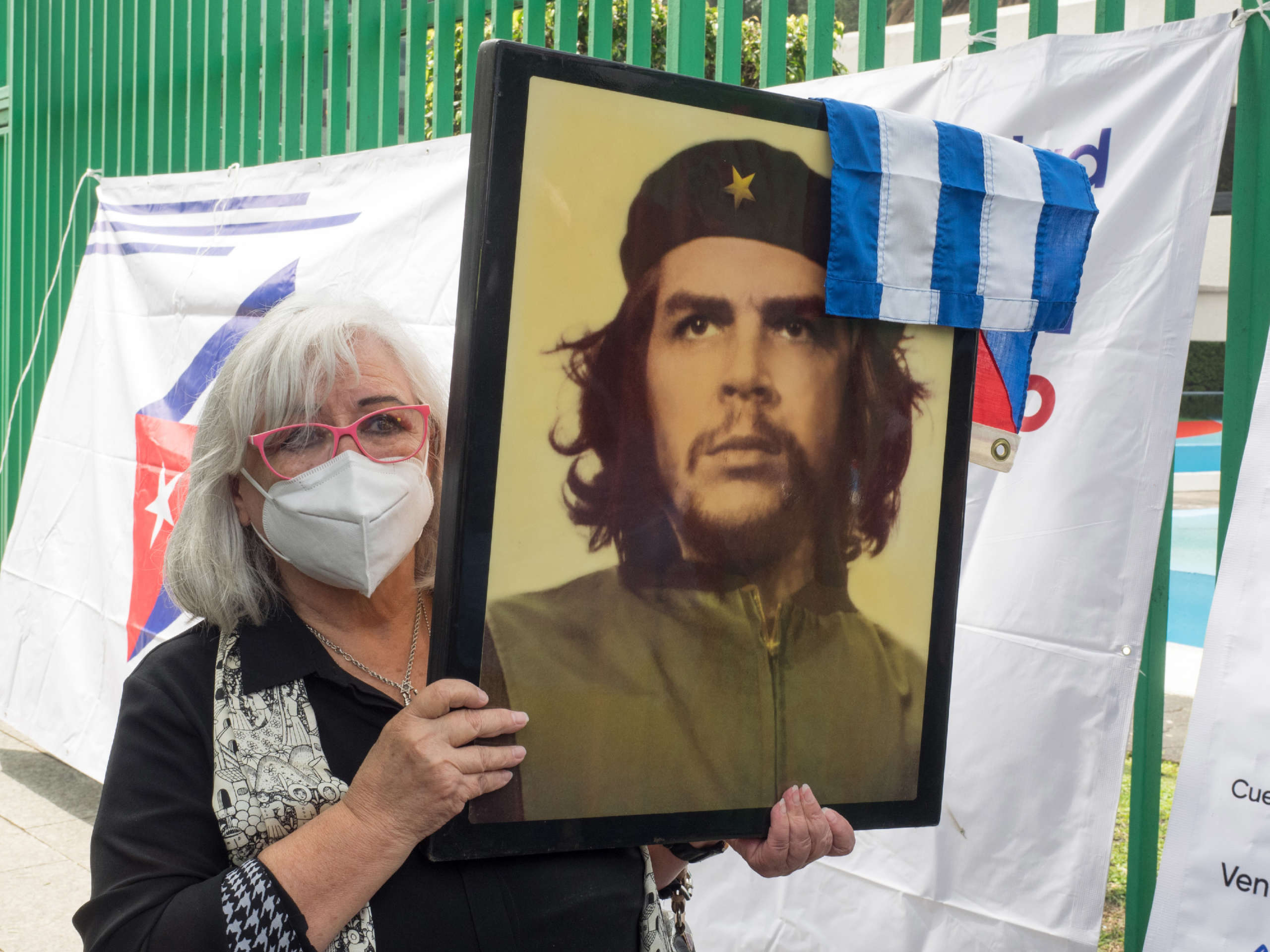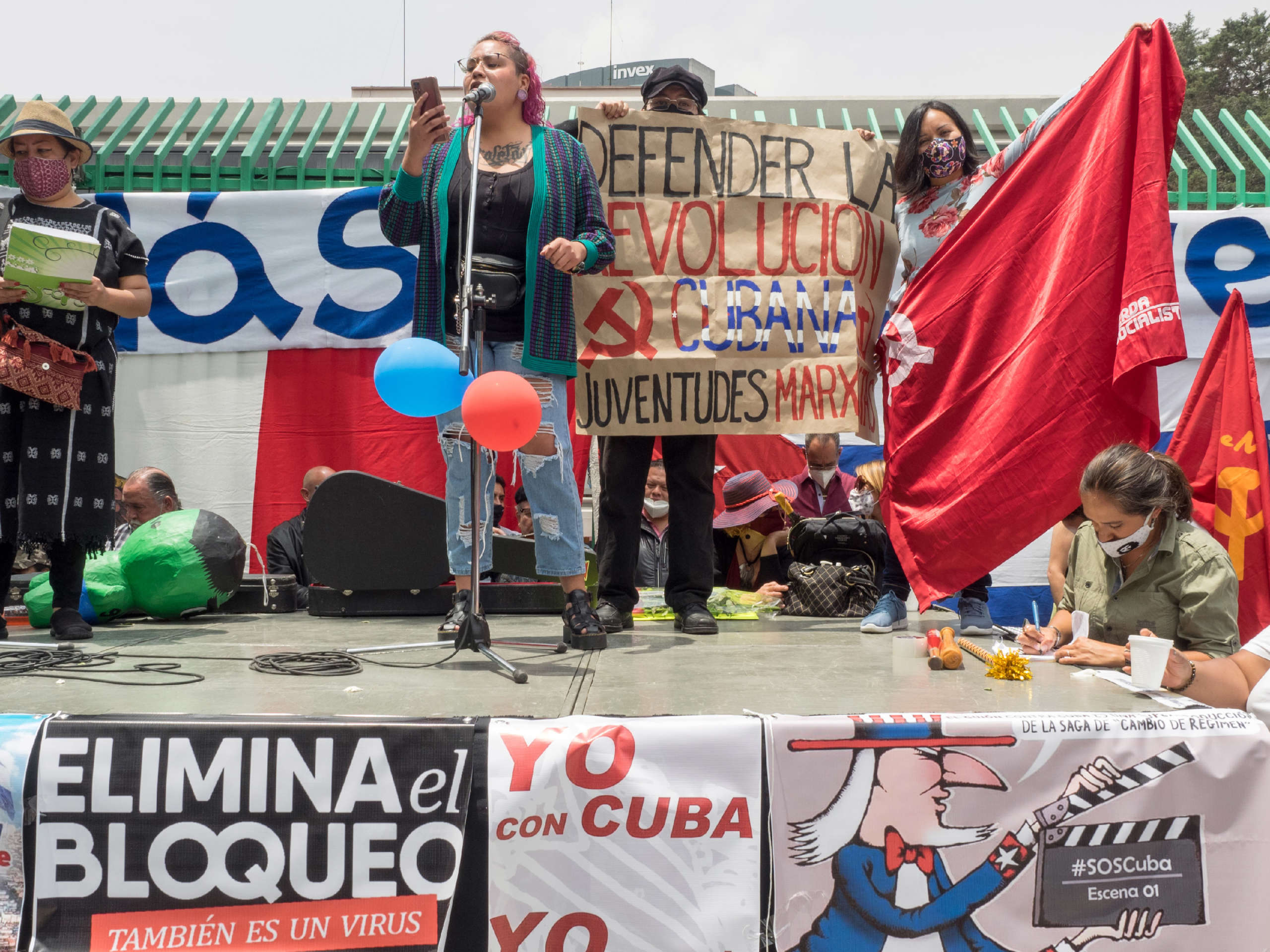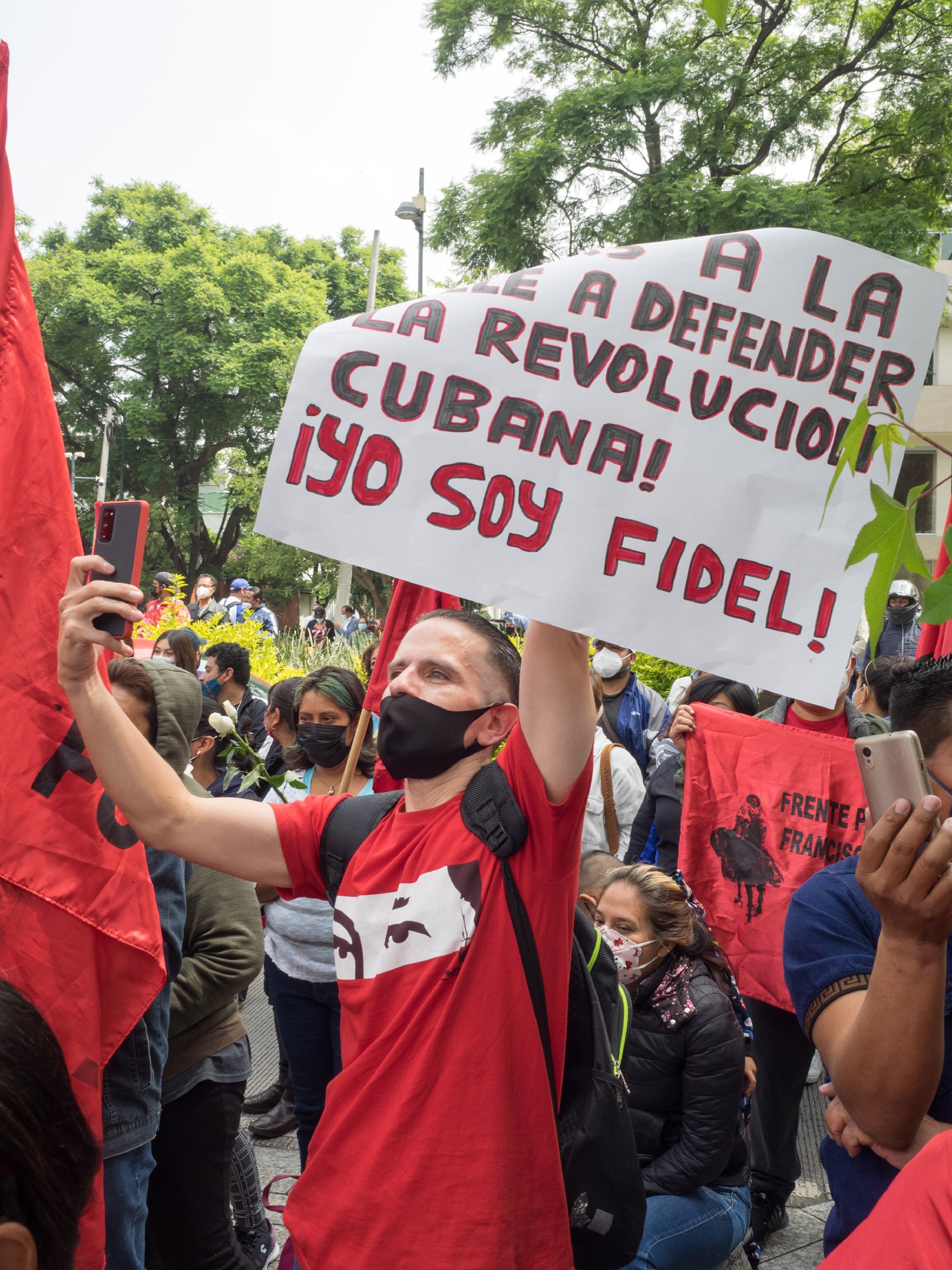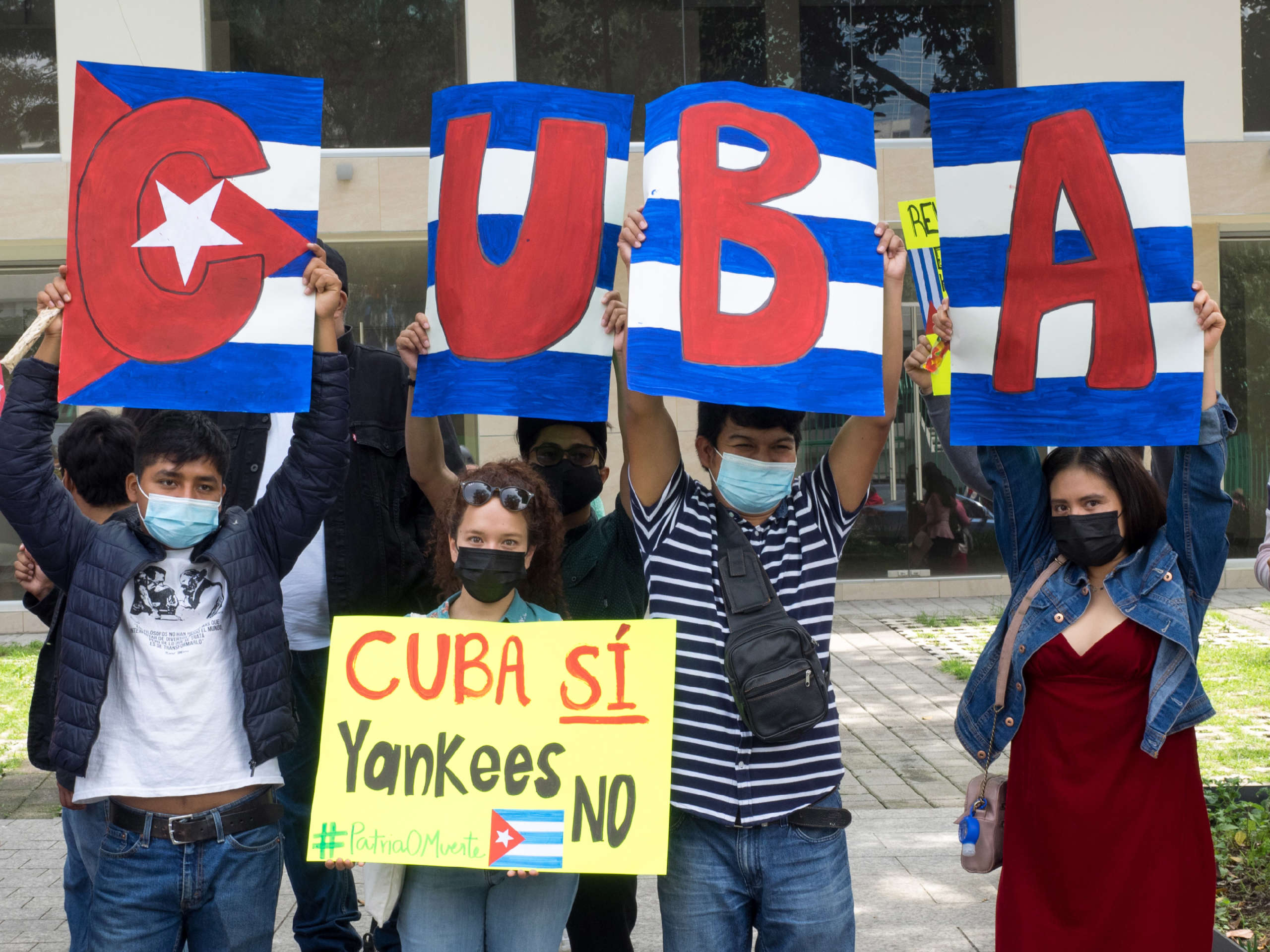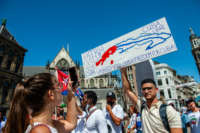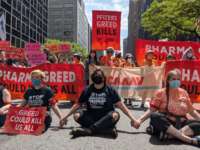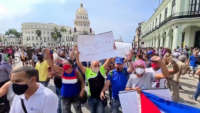
We go to Havana, Cuba, to look at what is behind protests that brought thousands of people into the streets of Havana and other cities in rare anti-government protests denouncing the island’s economic crisis during the COVID-19 pandemic. Cuba is facing its harshest phase of the pandemic with skyrocketing infections, and people are scrambling to cope amid shortages of medicine, food and other resources due to catastrophic U.S. sanctions. Thousands of others in Cuba led counterprotests in support of the Cuban Revolution and President Miguel Díaz-Canel. Cuban journalist Daniel Montero, a journalist with the independent news organization Belly of the Beast, says many people were demanding an end to communism on the island, but the protests were not entirely driven by ideology. “We just want more food. We just want medicine. We just want the basics,” he says many protesters told him in interviews.
TRANSCRIPT
This is a rush transcript. Copy may not be in its final form.
AMY GOODMAN: We’re beginning today’s show in Cuba, where demonstrators have taken to the streets of Havana and other cities in rare anti-government protests denouncing the island’s economic crisis during the COVID-19 pandemic. Cuba is facing its harshest phase of the pandemic with skyrocketing infections. People are scrambling to cope amid shortages of medicine, food and other resources due to catastrophic U.S. sanctions. Meanwhile, on Sunday, thousands of others led counterprotests in support of the Cuban Revolution and President Miguel Díaz-Canel.
This comes as the BBC reports one man has died during the protests in Cuba, and Amnesty International says more than 140 Cubans have either been detained or their whereabouts are unknown. During an interview on live television Tuesday morning, a Cuban YouTube star who was discussing the arrests said government security forces had come to detain her and take her to a Havana police station.
In a minute, we’ll speak with Cuban journalist Daniel Montero, who is a producer and journalist with the news organization Belly of the Beast. First, this video featuring him narrating what’s happening on the ground in Cuba.
DANIEL MONTERO: Thousands took the streets this Sunday in the biggest protests Cuba has seen in decades.
PROTESTERS: [translated] No more communism!
DANIEL MONTERO: The chants focused on civil liberties and the political system, but scarcities were the biggest factor fueling the demonstrations.
INTERVIEWER: [translated] Why have so many people come to the streets?
PROTESTER: [translated] Because of everything. Because of hunger, not enough medicine, the lack of everything. All this mixed together. Power shortages. All this mixed together.
DANIEL MONTERO: U.S. sanctions, intensified during the Trump administration, triggered Cuba’s economic crisis. But the protesters took their anger out on the Cuban government.
PROTESTERS: Díaz-Canel, [bleep]! Díaz-Canel, [bleep]!
DANIEL MONTERO: The 60-year-old U.S. blockade against Cuba was created to deny “money and supplies to Cuba … to bring about hunger, desperation and overthrow of government.” The Trump administration expanded the economic war against Cuba, strangling the island with more than 200 sanctions, like an oil blockade and restricting remittances and flights. During the pandemic, these sanctions escalated, hindering Cuba’s response to COVID. Rollout of Cuba’s vaccine was delayed because U.S. sanctions prevented raw materials from being imported, according to the Cuban government. Even now, as COVID cases in Cuba rise to their highest levels since the pandemic began, Joe Biden has done nothing to lift the sanctions. His response to Sunday’s events did not mention the embargo.
PRESIDENT JOE BIDEN: The United States stands firmly with the people of Cuba as they assert their universal rights. And we call on the government, the government of Cuba, to refrain from violence, their attempts to silence the voice of the people of Cuba.
PRESIDENT MIGUEL DÍAZ-CANEL: [translated] Isn’t it very hypocritical and cynical that you, the one who is blockading us and carrying out the policy that has most violated human rights of the Cuban people for more than 60 years and who intensifies it in the midst of a situation as complex as the pandemic, now wants to appear as the great savior? Lift the blockade.
DANIEL MONTERO: In Miami, Cuban American hard-liners have circulated a petition calling for a U.S. intervention.
MAYOR FRANCIS SUAREZ: [translated] The intervention may be something with the international community to provide help, or it may be something military. All options must be on the table.
COUNTERPROTESTERS: [translated] This street belongs to Fidel! This street belongs to Fidel!
DANIEL MONTERO: Hundreds of government supporters took to the streets in response to the protests.
GOV’T SUPPORTER: [translated] The U.S. government’s aggressive policies and the blockade intensify every day. The previous administration applied more than 240 sanctions. All that and the pandemic have exacerbated the country’s situation.
DANIEL MONTERO: In Havana, the government’s response to protests was mixed. In the neighborhood of Regla, protesters marched for hours peacefully, without a police response. In downtown Havana, encounters with the police were frequent and violent. Cuban musician Yomil tried to convince protesters to carry out a peaceful sit-in.
YOMIL: [translated] This is a historical moment for our community. We have to be smart. This is not about violence.
DANIEL MONTERO: But his appeal was ignored.
PROTESTER: [translated] The police can’t handle us! They don’t stand a chance!
DANIEL MONTERO: Government security forces detained dozens, possibly hundreds, of protesters. Protests ended Sunday night. The streets are calm, for now.
AMY GOODMAN: For more, we go to Havana, Cuba, to speak with Daniel Montero, Cuban journalist with the independent news group Belly of the Beast. He narrated the report you just heard.
Daniel, welcome to Democracy Now! Can you —
DANIEL MONTERO: Thank you for having me.
AMY GOODMAN: — start off by continuing to describe what’s happening in the streets? In the United States, the corporate media here says that just anger at the Cuban regime has blown up and that thousands are marching everywhere. And then you have, in Miami, people marching, as well. Can you give us your perspective on what’s happening? And were you yourself detained?
DANIEL MONTERO: Thank you so much for having me.
Well, first of all, what happened this July 11th was historical. There’s no denying that. I mean, not since 1994, thousands of people had taken to the streets. And back then it had to do with another major economic crisis we had, that one caused by the fall of the Soviet Union.
The thing is that right now a big number of things have combined. Like, we are not only going through the hardest moment of the pandemic in Cuba — we had been doing very well in the pandemic so far, but in the last months things have not been well. We have thousands of cases. At the same time, there’s big lines people need to do just to acquire the basics. There’s no medicine. So, all of these things have come together. And at the same time, I would say that everything people are seeing on media, especially media based out of Florida, that people now — everyone has access to internet in Cuba — I would say that the picture they’re painting to their audience is that one of a country falling to pieces and that we need help from wherever we can get it. So I think that when all of these things came together, then this happened.
Several cities across the country, people went to the streets. And of course the biggest ones happened here in Havana. I was in downtown Havana. I saw thousands of people there. They were calling for the end of communism. They were calling for a change. But the combination is interesting, because when you hear the things they’re saying when they sing together, it’s all about the politics of it. But when you talk to them — we were doing interviews in the streets. When you talk to them, they were just like, “We just want more food. We just want medicine. We just want the basics.” And I think that it’s quite an interesting combination.
There were violent encounters in the streets. In the area I was — I was in, there was a lot of violence, I would say, and a lot of people got injured, both from the protesters and from the police. There were arrests. I was arrested myself while we were filming. I was released later that night. So, that’s kind of what happened during that day.
Now, what’s worrying for us is that the picture that’s been painted so far is that people are still in the streets by the thousands and that the country is a complete chaos. And that is not what I am seeing here. Yes, Sunday was worrying, but it has — it’s more calm since. I would say it’s very tense, you know, because — precisely because it is almost unprecedented. So we’re all just worried, basically. But things are a bit calmed down.
JUAN GONZÁLEZ: And, Daniel Montero, could you talk a little bit about the generational divide in terms of the protests, in terms of who is participating? And what happened after President Miguel Díaz-Canel called on supporters of the Cuban government to come out into the streets? Was there any — because, obviously, in Cuba, those people who have covered Cuba in the past know that, at times, the government can call millions of people out into the streets when it wants to support a particular public manifestation.
DANIEL MONTERO: Yes, yes. After the anti-government people took to the streets, in the afternoon, President Miguel Díaz-Canel went on national television and called on his supporters to take the streets. And there was a lot of [inaudible] people that also took to the streets. And in some cases you would have, you know, in the same places, anti-government and pro-government people having it out, yelling at each other. And I didn’t witness it myself, but I do know that I have seen reports that some violence in some cases unraveled when this happened.
In terms of a generational divide, I think it’s very much real. You know, I think the younger generations, like mine, we’re less worried about the ideology of our political system and more about, you know, just having things work, and work for [inaudible]. And, of course, an older generation, I would say, my parents’ generations or my grandparents’ generation, it’s different. You know, they sort of built what we’re seeing now, what’s called the Cuban Revolution. So I think they have more of an ideological commitment to government. And that is what we saw on the streets. You know, most of the people that went out, anti-government people, were younger. And then, the pro-government people, you could say, belong to a bit older generation.
JUAN GONZÁLEZ: And I wanted to ask you about the impact — this mention of the over 200 new sanctions that were imposed during the Trump era, that the Biden administration has so far not yet rolled back, and also the COVID situation. There has been a resurgence of COVID, or a, actually, new surge in COVID in Cuba, but it’s still relatively small, from what I can tell. For instance, there have been about 1,600 total deaths since the pandemic began in Cuba, a nation of 11 million. New York City alone has had 33,000 deaths since the pandemic, and New York City actually has less people than the Cuban population. And so, I’m wondering: How big an impact has been this surge of COVID? And also, could you detail a little bit more about these sanctions? What were the kinds of sanctions that Trump imposed that did not exist previously?
DANIEL MONTERO: Well, first of all, the Trump administration, what they did in terms of sanctions on Cuba, first of all, it came as a shock, because we had just come out of [inaudible] in those last couple of years of his presidency, and, you know, we were all very hopeful that this reengagement policy — because it was having very good consequences on our economy, especially when it comes to tourism. And then, tourism is one of the first areas in which we can see the consequences of what the Trump administration did. They basically rolled out all of the policies Obama was adopting, and they started applying more than 200 sanctions, like tourism, if they ban cruise ships. They forbid flights to other cities than — to other cities that wasn’t Havana. That had a toll on our tourism revenue.
Then, the other sanctions, like they applied an oil blockade. At some point in Cuba, we had a major oil crisis because the United States was stopping the oil that came into the country. And not just that, like, what the embargo as a whole means is that it is harder for — in many cases, impossible — to do business with other countries, with companies. So that makes it very hard to access food, medicine, the basics.
Now, when you bring that into a pandemic, in which the Trump administration did not slow down at all — they actually increased what they were doing — this causes even bigger harm, because then the COVID response of the country was harmed by the policies of the Trump administration. And it is very important to understand that this war that the United States has been waging against Cuba, just because Donald Trump is no longer president, it doesn’t mean it’s no longer in place, because even though Joe Biden is six months into his presidency, all of the sanctions that Trump applied are still in place. So that is very important to understand.
AMY GOODMAN: I wanted to —
DANIEL MONTERO: Now, when it comes to — yeah, yeah.
AMY GOODMAN: — go to Secretary of State Antony Blinken speaking Monday about Cuba.
SECRETARY OF STATE ANTONY BLINKEN: Over the weekend, tens of thousands of Cubans took to the streets on the island to exercise their rights to assemble peacefully and express their views. The protesters called for freedom and human rights. They criticized Cuba’s authoritarian regime for failing to meet people’s most basic needs, including food and medicine. In many instances, peaceful protesters were met with repression and violence. The Biden-Harris administration stands by the Cuban people and people around the world who demand their human rights and who expect governments to listen to and serve them rather than try to silence them. Peaceful protesters are not criminals, and we join partners across the hemisphere and around the world in urging the Cuban regime to respect the rights of the Cuban people to determine their own future, something they have been denied for far too long.
AMY GOODMAN: So, that is Secretary of State Tony Blinken. Daniel Montero, if you can respond? And also, do you know what happened with the person who died in the protests, those reports of that?
DANIEL MONTERO: Yes. Well, first of all, with what secretary of state just said, well, I think, you know, he’s being very polite, but I think it is — it is always, in a way, uncomfortable for us, as Cubans, to listen to any American politician wishing us the best, while at the same time applying a policy that’s exactly the opposite, you know? Sure, who can oppose to the idea of a government listening to its people and the idea of everything working out for the better? Sure. That is ideal. But at the same time, it’s a bit hypocritical to not mention the biggest problem to our economy. We’re talking about a moment in which we’re living in crisis. People are taking to the streets because we are in a crisis. And that crisis is largely due to the United States sanctions. So, to come out and just support people, no. I mean, the biggest support the Biden administration could offer to the Cuban people is to lift the sanctions, especially during the period of the pandemic.
Now, when it comes to the protester that died, I think a lot of details have not been released. I think I would say I am not surprised that it happened, because I was on the streets and I saw that, in several cases, things got out of hand. I would not justify the behavior of the police at all in the cases where it got wrong. I would also say that I also saw protesters who did the same. It was a, actually, very hard thing for me to watch. You must understand, we are not used to seeing this in Cuba. This is historical, as I said. This has never happened during my lifetime. I’m only 25 years old. So I was shocked to witness this, you know, Cubans fighting Cubans. And sadly, I’m not surprised that it happened, although, of course, I’m sad that it did. But a lot of details have not been released.
JUAN GONZÁLEZ: And could you comment about the reaction of Cuban Americans in the United States, especially in South Florida? At times, there seemed to be bigger protests in Florida than there were in Cuba in terms of actual people in the streets.
DANIEL MONTERO: Yes. Well, look, you know, the Cuban Americans in Florida, in many cases, can be blinded by some of the coverage that they have. I would say this. Look, I can accept any comment, and I think that the idea of all of the Cubans, the Cubans here and the Cubans abroad, coming together and discussing the issues of the country, I think that is an amazing idea and something we should all go for. But what has shocked me the most is to have Cuban Americans in Florida asking for a military intervention. This is like — this is some of the most colonial behavior I have ever seen in my life. It’s like, because if you have any understanding of what a military intervention is, like, how can you call for another country’s army to invade your country? That, for me, is simply outrageous. I don’t know how else to describe it. Sorry if I — it’s not most professional, but it is my country.
AMY GOODMAN: Well, Daniel Montero, I want to thank you so much for being with us, Cuban journalist with the independent news organization Belly of the Beast, joining us from Havana, Cuba.
When we come back, we go to Washington, D.C., to speak with Texas state representatives. Why are they in D.C. and not in Austin? Well, they led the movement of Texas state Democrats to leave what they call the “suppression session” to fight for federal voting rights legislation and to stop a voting rights bill from passing in the Texas Legislature. Stay with us.
This post was originally published on Latest – Truthout.
